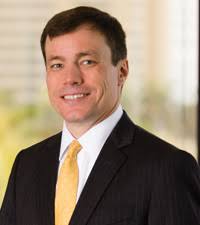An interview with Joe Chase, attorney with the Gunster Law Firm
As part of its series “The Business of Climate Change,” which highlights the climate views of business men and women throughout the state, The Invading Sea spoke with Joe Chase, a business and corporate attorney with Gunster Law Firm.
Here are some highlights from the interview.
You’ve been involved in the South Florida business scene, serving in a lot of different roles. How are chambers of commerce and other alliances in that area working with local businesses to address major issues like climate change and sea-level rise?
A major initiative I’ve been part of is the South Florida Business Council. I’m the chair this year, and the SFBC has spent a lot of time thinking about sea-level rise. We really all need to work together, establish best practices, support the efforts of the experts, and help the business communities understand that this will impact their bottom line.
Frankly, if we don’t manage this problem, South Florida will become a much less attractive place to live and do business. This is a problem that can be managed, but we have to take it seriously. It requires investment. It requires regional solutions.
What does economic resiliency look like in a place like South Florida? How are businesses there adapting?
I don’t think the initial impact is on most businesses. The impact is more second-level. One thing we’ve seen that’s been incredibly promising for our region is there’s been a lot of talk about folks moving down from the Northeast, folks in the finance sector coming down for a better lifestyle, for tax reasons, coming down because now with technology and such and great transportation connections to the Northeast, it’s easy to be based in South Florida.

So here we are at this really interesting point in our region’s development where, on the one hand, we’re on the cusp of this really incredible opportunity to become a much more diversified economy, a finance sector to have all kinds of incredible development into our region.
On the other hand, we’re on the cusp of a really scary situation with sea-level rise that could really put a halt to that first phenomenon if we don’t manage it. So, I think it’s really important for businesses to understand that we’re living through a really exciting time. It’s full of potential, but if we do not manage this one issue, sea-level rise and some of the related issues that come out of it, we’ll miss that opportunity and could actually regress.
There seems to be a lot of collaboration, from businesses alliances to public-private partnerships all over the state, and most say that there is opportunity for business and climate change. If there are opportunities, what are they?
Dealing with climate change is going to require a significant investment, so any company that’s involved in engineering and the construction side of whatever infrastructure projects might be needed, there’s going to be opportunity there on an individual level. I think we’re increasingly going to see retrofitting of existing properties, which won’t necessarily be government-driven.
You’re going to have some multipliers through our economy that’ll be positive. But aside from that, I come back to the broader point that it’s not so much that these efforts necessarily create opportunities, but we are at a stage in our development as a region that could be transformative, and if we don’t get sea-level rise right, we will miss that.
What can lawmakers in Tallahassee do to help businesses address these issues on the policy side?
I think the investment needs to be at all levels of government. We have this affordable housing crisis we talk about all the time that’s going to get a lot worse if much of the affordable housing stock in a place like Palm Beach County becomes much more susceptible to flooding than it already is.
Developers are starting to buy property in areas like Little Haiti, seemingly in part because those areas have higher elevations and are more resilient in terms of sea-level rise. You look at how that compounds an existing issue with gentrification.
Some of our less affluent and less privileged communities have lost affordable places to live in communities that had been close-knit for a long period of time. Without local government taking its land-use function seriously and taking the well-being of those people seriously and passing zoning regulations and approving projects and imposing appropriate conditions of approval and without appropriate flexibility from the state government to allow municipalities to take those types of actions, and without appropriate grants and guidance and other support that can be provided by the federal government, that’s going to be another real problem.
Kevin Mims, a Florida-based freelance journalist, is the producer of “The Business of Climate Change.” He conducted this interview with Mr. Chase.
“The Invading Sea” is the opinion arm of the Florida Climate Reporting Network, a collaborative of news organizations across the state.



